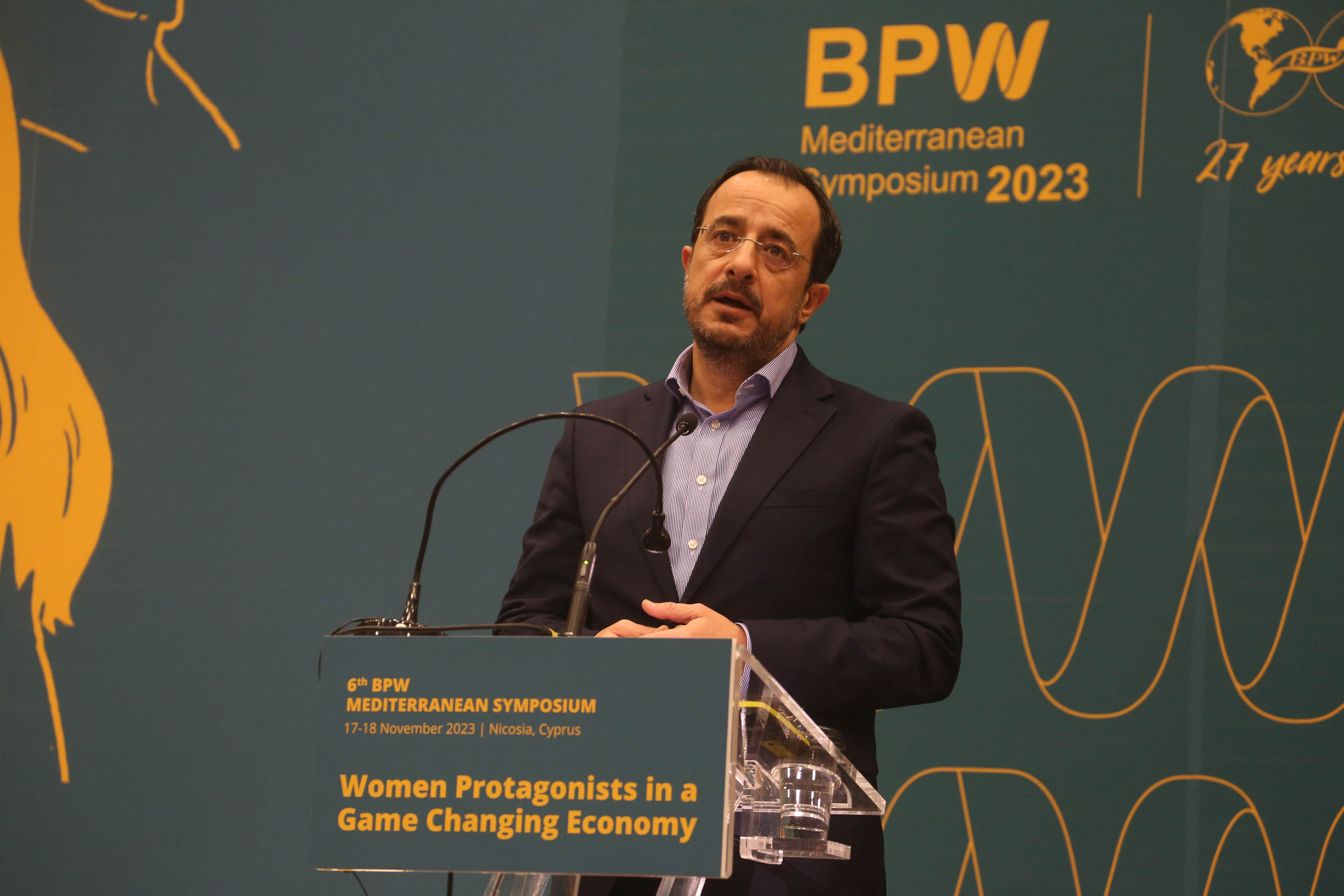Press Releases

18-11-2023 12:32
Address by the President of the Republic, Mr Nikos Chrisodoulides, at the 6th BPW Mediterranean Symposium – Women protagonists in a game changing economy
It is with great pleasure that I welcome you in Cyprus, to the 6th Annual Business and Professional Women (BPW) Mediterranean Symposium.
I wish to warmly thank the BPW Europe Regional Coordinator, Ms Anu Viks, and the President of BPW Cyprus, Ms Tasia Yiannara Yiallourides, for their committed efforts and for organising this Symposium that has brought together such a remarkable audience.
It is no exaggeration to say that BPW International is one of the most important networks of its kind for women. The significance of its work and contribution is also reflected in its consultancy capacity in the Economic and Social Council of the United Nations and its participation in the European Women’s Lobby. At the same time BPW members contribute to society by providing women opportunities for:
- Empowerment through professional and leadership development
- Promoting and upholding their rights
- Promotion of equal opportunities, and
- Encouragement of lifelong learning in professional and educational settings.
Women make up half of the global population. As a father of four daughters myself, I am fully aware that active, fair, and equal opportunities throughout all areas of society do not really exist. This results in the creation of negative stereotypical views and actions being imposed on women.
The challenges that women face in the 21st century are becoming more and more demanding. Economic and social turbulence, as well as geopolitical challenges have exacerbated the problems we are currently facing. Now is the time to act decisively and effectively to face these challenges and formulate creative strategies and solutions.
In this regard, the BPW’s theme for this year “Women Protagonists in a Game-Changing Economy”, in honour of International Women’s Entrepreneurship Day, is very topical.
In fact, as the World Bank data tells us, the gender gap in labour force participation ranges between 13%-26%. Women often work in lower-paying jobs/ sectors and have less access to social safety nets when they do participate in the workforce. The COVID-19 crisis has worsened the situation, with disproportionate economic and social consequences on women and girls, as a result of the financial exclusion, gender digital divide, a greater burden of unpaid care work, and other gender-based inequalities.
In particular, it is estimated that closing the gender gap in the workforce could add up to 28 trillion USD to the global GDP; imagine the added value to the society, if you add to the economy benefits human rights and social equality.
In pursuing this goal, one of the major hurdles that needs to be addressed is the lack of women in leadership positions. This challenge we face underpins a vast majority of our policy battles. Women remain underrepresented in senior positions around the world, from corporate boardrooms to the courts and political arenas. This lack of balance hinders not only women, but all people from all walks of life.
We are well aware that in each and every decision we make, it is imperative to ensure that the population as a whole is represented. We need more women in decision making at all levels. Women bring a different perspective to the decision-making table than that of men and, therefore, this is one of the reasons that I have appointed a total of 44% of women in my government. And this is the highest percentage since 1960 in Cyprus and one of the highest in the EU.
We all recognise the problems, the challenges as far as gender inquality is concerned. I am a bit concerned that it is becoming a bit of fashion talking about gender inequality. What is more important is what we are doing to face the challenges. So, I strongly believe that it is high time that we work in a holistic manner to really promote gender equality.
In this framework, our governance programme includes a number of horizontal substantial policies that aim to promote equality between women and men. The goal can be achieved by ensuring quality education for all and equal access to all areas including health and work.
A number of policies we are focusing on include:
- Equal representation of women and men in decision-making positions. It is already at 44%, and by 2024 it is going to be 50%.
- Implementation of Gender Budgeting. We plan to integrate the gender dimension at all levels of the state budget preparation process.
- Preventing and combating violence against women and girls, protecting the victims, including those of domestic violence.
- Gender Economy and Work. We promote the harmonisation of family and professional life. In this respect, we plan to increase maternity leave from 18 to 22 weeks and paid paternity leave to 8 weeks, which can supplement maternity leave.At the same time, our government through the Deputy Ministry for Social Welfare is implementing policies that will allow women to balance professional and personal life through the creation of childcare and structures for the elderly, since we are very well aware that the burden, as a result of gendered serotypes falls on women. The Office of the Commissioner has also recently signed a Memorandum of Understanding (MoU) with the Cyprus Chamber of Commerce and Industry, to work strategically to promote gender equality in the business sector.
- Gender policies in Health. We strengthen the national prevention programs based on EU and international standards.
- Gender policies and Education, by enriching the content of our educational programmes with actions that promote empathy, gender equality, prevention of violence against women, consent, and respect, so that schools respond to the multicultural dimension of the modern world and above all to promote healthy relationships.
- Gendered Foreign Policy. Following the example of the EU and other Member States, we plan to appoint an Ambassador for Gender Equality.
- Strengthening the role of the Office of the Gender Equality Commissioner and mainstreaming gender across all government policies.
Since taking office in March 2023, we have also embarked on elaborating a new strategy for Gender Equality 2024-2026 in collaboration with all ministries and deputy ministries. In doing so, each Ministry and Deputy Ministry has appointed a focal point for Gender Equality.
In conclusion, I wish to stress the vital contribution of women entrepreneurs to society in various fields, from science and technology to social activism and politics.
Women entrepreneurs create jobs and contribute to economic growth and social progress worldwide. Their contribution to economic growth in the areas of job creation, poverty alleviation, environmental vitality, wealth creation and human capital is remarkable. Women-led businesses are estimated to grow 90% in the next five years. Women have also been instrumental in creating new industries, such as the tech industry, and have been at the forefront of developing innovative products and services. We have more and more women in jobs that are considered male-dominant, women in STEM and women creating startup companies.
BPW is an integral part of this dynamic process of driving and motivating women entrepreneurs in the economic development. Your work is testament to the tremendous progress we have witnessed and remarkable potential that needs to be seized.
(RM/NG/IA)
Relevant Press Releases







